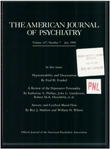Sleep disorders in the elderly
Abstract
In their own practices and in consultation, requests to psychiatrists to evaluate and treat sleep disorders in the elderly are common. The five million elders in this country receive 35%-40% of the sedative- hypnotics prescribed, despite the fact that they represent only 12% of the population. Since their sleep disturbances are usually secondary to medical, psychiatric, pharmacologic, or environmental causes, they should receive a thorough evaluation and differential diagnostic approach. Before prescribing a sedative-hypnotic, one should consider nonpharmacologic interventions and education about normal sleep changes due to aging. As a foundation for the judicious prescribing of sedative- hypnotics, the pharmacokinetic changes associated with aging are discussed.
Access content
To read the fulltext, please use one of the options below to sign in or purchase access.- Personal login
- Institutional Login
- Sign in via OpenAthens
- Register for access
-
Please login/register if you wish to pair your device and check access availability.
Not a subscriber?
PsychiatryOnline subscription options offer access to the DSM-5 library, books, journals, CME, and patient resources. This all-in-one virtual library provides psychiatrists and mental health professionals with key resources for diagnosis, treatment, research, and professional development.
Need more help? PsychiatryOnline Customer Service may be reached by emailing [email protected] or by calling 800-368-5777 (in the U.S.) or 703-907-7322 (outside the U.S.).



